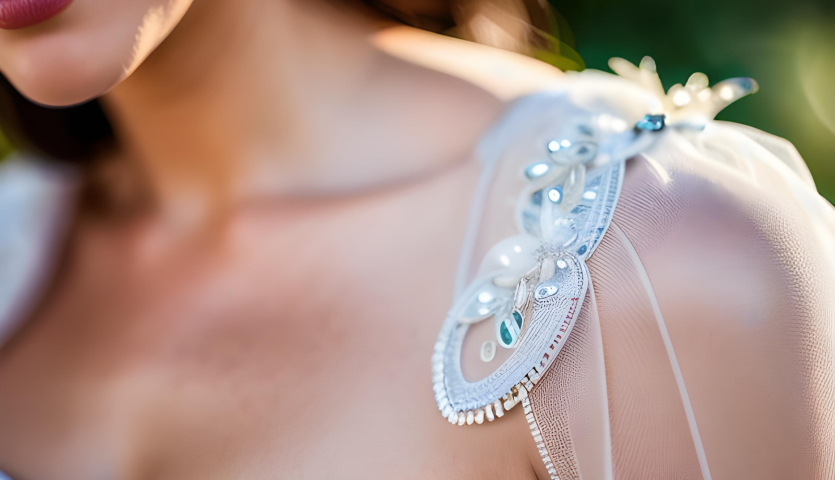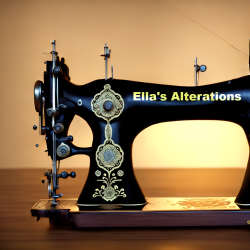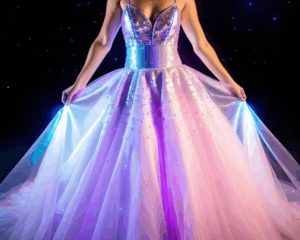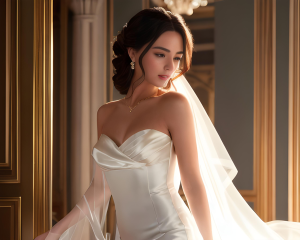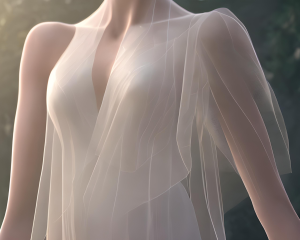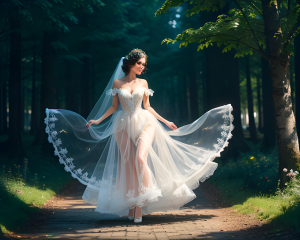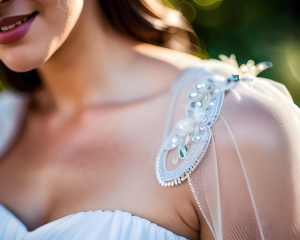Demystifying Tulle: A Guide to Different Types of Tulle on Wedding Dresses. | ||
|---|---|---|
IntroductionBackground Wedding dresses are an essential component of a bride’s special day, embodying her unique style, personality, and dreams. Among the many fabric options available, tulle holds a special place in the bridal fashion world. Its delicate and ethereal qualities have made it a favorite choice for creating romantic and whimsical wedding gowns. However, the wide range of tulle types can be overwhelming for brides-to-be and even fashion enthusiasts. Understanding the distinctions between these various types of tulle is crucial to ensure that the chosen fabric aligns with the desired style and overall vision of the wedding dress. Purpose of the Guide The purpose of this guide is to demystify tulle by providing a comprehensive overview of the different types of tulle commonly used in wedding dresses. By delving into the origins, manufacturing process, and characteristics of each type, brides-to-be and fashion enthusiasts will gain a deeper understanding of tulle fabrics. Armed with this knowledge, they can make informed decisions when selecting their dream wedding dress, ensuring that the tulle chosen is the perfect fit for their style, preferences, and overall wedding theme. This guide will explore the history of tulle, shedding light on its origins in the city of Tulle in France during the 18th century. It will then delve into the manufacturing process of tulle, unveiling the intricate weaving techniques involved in creating this delicate fabric. The guide will also discuss the key features and properties that make tulle such a sought-after fabric for wedding dresses, including its lightweight nature, sheer appearance, and exquisite draping capabilities. The heart of this guide lies in the exploration of different types of tulle used in wedding dresses. Each section will provide a detailed examination of a specific type of tulle, including classic tulle, illusion tulle, silk tulle, English netting, French netting, sparkle tulle, soft tulle, and organza tulle. By understanding the unique characteristics and applications of each tulle variant, brides-to-be will be empowered to make educated choices when selecting the perfect fabric for their wedding dress. Additionally, this guide will offer practical guidance on choosing the right tulle for a wedding dress. Factors such as dress style, theme, comfort, silhouette, personal preferences, and professional advice will be discussed to aid brides-to-be in making well-informed decisions. Moreover, the guide will provide insights into tulle care and maintenance, including storage tips and cleaning recommendations, ensuring that the fabric retains its beauty and integrity over time. This guide serves as a comprehensive resource for demystifying tulle and providing a comprehensive understanding of the different types of tulle used in wedding dresses. By empowering brides-to-be with knowledge about tulle fabrics, their characteristics, applications, and care requirements, this guide aims to assist them in choosing the perfect tulle to bring their wedding dress visions to life. | ||
| ||
Understanding Tulle2Origins and History Tulle, the delicate and translucent fabric that has become synonymous with grace and romance, originated in the city of Tulle in France during the 18th century. It was initially crafted from silk, which lent it a luxurious and refined quality. Tulle gained popularity as a fabric for veils, giving brides an ethereal and timeless appearance on their wedding day. Over time, the production of tulle expanded to incorporate various materials such as nylon, rayon, and polyester. This diversification allowed for greater versatility and affordability, making tulle accessible to a wider audience. Manufacturing Process The manufacturing process of tulle involves intricate weaving techniques that result in its characteristic net-like structure. Fine threads, usually made from synthetic materials such as nylon or polyester, are twisted and knotted together to form the distinctive diamond-shaped holes that give tulle its ethereal appearance. The weaving process can vary in density and tightness, resulting in different levels of sheerness and stiffness in the fabric. Traditionally, tulle was handcrafted on looms. However, with advancements in technology, machine-made tulle became more prevalent, allowing for mass production and greater accessibility. Modern manufacturing techniques have further improved the quality and consistency of tulle, ensuring that each yard of fabric possesses the same delicate and intricate features. Key Features and Properties Tulle possesses several key features and properties that contribute to its appeal in the realm of wedding dresses: Lightweight: Tulle is renowned for its feather-light weight, making it an excellent choice for creating voluminous and flowing silhouettes. Its airy nature adds a sense of ethereal elegance to wedding gowns, allowing brides to move with grace and ease. Sheerness: One of the defining characteristics of tulle is its sheer appearance. The tiny diamond-shaped holes in the fabric create a delicate and translucent effect, giving the dress a romantic and dreamy quality. The level of sheerness can vary depending on the type of tulle, allowing for customization based on the desired aesthetic. Drapability: Tulle possesses exceptional draping qualities, allowing it to cascade and flow beautifully. It lends itself well to layered designs, overlays, and veils, adding dimension and movement to the overall look of the dress. The fabric effortlessly embraces the body’s contours, creating an elegant and flattering silhouette. Versatility: Tulle is an incredibly versatile fabric that can be utilized in various ways. It can serve as an overlay to add texture and depth to a gown, or it can be used as a standalone fabric for an ethereal and romantic look. Tulle can also be embellished with embroidery, beads, sequins, or appliqués, providing endless possibilities for customization and personalization. These distinctive features and properties of tulle contribute to its enduring popularity in the world of bridal fashion. The fabric’s delicate nature and enchanting qualities make it a favored choice for brides seeking to create a romantic and ethereal ambiance on their wedding day. | ||
| ||
| Ella’s Alterations LLC 813-445-8894 https://ellasalterations.com | ||
Different Types of TulleTulle encompasses a wide range of variations, each with its own unique characteristics and applications in the realm of wedding dresses. Understanding the different types of tulle is essential for brides-to-be, as it enables them to choose the fabric that best aligns with their desired style, silhouette, and overall vision for their wedding gown. Let’s explore the various types of tulle in detail: Classic Tulle Classic tulle, also known as bridal tulle, is the most commonly used type of tulle in wedding dresses. It is typically made from nylon or polyester and is characterized by its lightweight and sheer properties. Classic tulle offers a soft and romantic appearance, making it versatile and suitable for various dress styles. Whether used as an overlay, layering fabric, or veil, classic tulle adds a touch of elegance and ethereal beauty to the gown. Illusion Tulle Illusion tulle is a fine, sheer fabric that is often used for creating illusion necklines, sleeves, or backs in wedding dresses. It is designed to give the illusion of bare skin while providing support and structure. Illusion tulle is usually made from nylon or polyester and can be embellished with lace, embroidery, or beadwork to create intricate and delicate designs. This type of tulle allows brides to showcase intricate details while maintaining modesty and adding a touch of allure to their wedding dress. Silk Tulle Silk tulle is considered the epitome of luxury in the world of bridal fabrics. Crafted from 100% silk, this variant offers a refined texture and a natural sheen that adds a touch of opulence to any gown. Silk tulle is exceptionally lightweight and breathable, making it comfortable to wear throughout the wedding day. Its draping qualities are unparalleled, allowing for the creation of flowing and ethereal silhouettes. Silk tulle is a popular choice for brides seeking a high-end and premium fabric for their wedding dress. English Netting English netting, also known as English tulle, is a type of tulle that exhibits a slightly stiffer texture compared to classic tulle. It features larger diamond-shaped holes and a more structured appearance. English netting is commonly used to create structured skirts and veils, providing a touch of vintage elegance to the overall design. This type of tulle is often chosen by brides who desire a gown with more volume and structure while maintaining an ethereal and romantic aesthetic. French Netting French netting, also referred to as Russian netting, is renowned for its delicate and soft feel. It features a distinctive hexagonal pattern and a finer texture compared to other types of tulle. French netting is commonly used to create birdcage veils, fascinators, and vintage-inspired accessories. Its sheer appearance and lightweight nature allow for the creation of delicate and feminine accents that perfectly complement the overall bridal look. Sparkle Tulle Sparkle tulle is a variant of tulle that incorporates metallic or glittery threads woven into the fabric. This type of tulle adds a touch of glamour and sparkle to wedding dresses, making it an excellent choice for brides who want to shine on their special day. Sparkle tulle is available in various colors and finishes, ranging from subtle shimmer to bold glitter. It can be used as an overlay, as a layering fabric, or even as the primary fabric to create a gown that catches the light and adds an element of enchantment. Soft Tulle Soft tulle is renowned for its exceptional draping and flowing qualities. It is incredibly lightweight and possesses a delicate, ethereal appearance. Soft tulle is often chosen for creating whimsical and romantic gowns with a dreamy silhouette. Its softness allows for graceful movement, making it ideal for layered skirts, overlays, or veils. Soft tulle adds a touch of enchantment and elegance to the overall bridal look. Organza Tulle Organza tulle combines the structure of organza fabric with the sheer qualities of tulle. It offers a crisp and slightly stiffer texture compared to other tulle variants. Organza tulle is commonly used for creating structured skirts or overlays, providing volume and definition to the dress. It is particularly suitable for gowns that require more architectural elements and a distinct silhouette. By understanding the characteristics and applications of each type of tulle, brides-to-be can make informed decisions about the fabric that best aligns with their desired style, silhouette, and overall vision for their wedding dress. Each variant of tulle offers a unique set of properties, allowing for endless possibilities in creating a gown that is both enchanting and personalized. | ||
| ||
| Suit Alterations 101: A Beginner’s Guide to Tailoring | ||
| Ella’s Alterations LLC 813-445-8894 https://ellasalterations.com | ||
Characteristics and ApplicationsUnderstanding the specific characteristics and applications of different types of tulle is essential for brides-to-be when choosing the fabric that will best bring their wedding dress visions to life. Each type of tulle possesses unique properties that contribute to its overall look, feel, and versatility. Let’s delve into the characteristics and applications of each type of tulle in detail: Classic Tulle Characteristics:
Applications:
Illusion Tulle Characteristics:
Applications:
Silk Tulle Characteristics:
Applications:
English Netting Characteristics:
Applications:
French Netting Characteristics:
Applications:
Sparkle Tulle Characteristics:
Applications:
Soft Tulle Characteristics:
Applications:
Organza Tulle Characteristics:
Applications:
By considering the specific characteristics and applications of each type of tulle, brides-to-be can choose the fabric that best suits their desired style, silhouette, and overall vision for their wedding dress. The versatility and unique properties of tulle allow for endless possibilities in creating a gown that is both enchanting and personalized. | ||
| ||
Choosing the Right Tulle for Your Wedding DressSelecting the perfect tulle for your wedding dress involves considering various factors, such as dress style, theme, comfort, silhouette, personal preferences, and professional advice. Here are some essential guidelines to help you make an informed decision: Dress Style Consider the style of your wedding dress when choosing the type of tulle. Classic tulle is versatile and suits various dress styles, while illusion tulle adds a touch of allure to specific areas of the gown. Soft tulle creates a romantic and whimsical look, while English netting offers a vintage-inspired aesthetic. Match the tulle type to the overall style of your dress to ensure cohesiveness and a harmonious bridal look. Theme and Wedding Venue Think about the theme and venue of your wedding. For a traditional or classic theme, classic tulle or silk tulle may be suitable, exuding elegance and sophistication. If you’re having a vintage-inspired wedding, French netting or English netting can add a touch of nostalgia. Sparkle tulle can be a fantastic choice for a glamorous or evening wedding. Consider how the tulle will complement your chosen theme and venue, ensuring it aligns with the overall ambiance and atmosphere. Comfort and Wearability Remember that comfort is key when choosing your tulle fabric. Consider the weight and texture of the tulle and how it feels against your skin. Soft tulle and silk tulle are lightweight and breathable options that offer comfort throughout the day. Additionally, consider the climate of your wedding location and how the tulle fabric will fare in different weather conditions. Opt for tulle that allows you to move with ease and ensures you feel comfortable and confident on your special day. Silhouette and Structure Take into account the silhouette and structure you desire for your wedding dress. If you prefer a flowing and ethereal silhouette, soft tulle or silk tulle is an excellent choice as they drape beautifully. For a more structured and voluminous look, consider English netting or organza tulle. The type of tulle you choose will affect the overall shape and form of your dress, so ensure it complements your desired silhouette. Personal Preferences Your personal preferences play a significant role in choosing the right tulle. Consider the level of sheerness you desire, whether you prefer a subtle shimmer or bold glitter. Think about whether you want plain tulle or tulle with embellishments, such as lace appliqués or beading. Take the time to explore different tulle samples and visualize how they align with your vision and personal style. Trust your instincts and choose the tulle that resonates with you the most. Professional Advice Seek professional advice from bridal consultants, designers, or seamstresses who have expertise in wedding dresses. They can provide valuable insights and guidance on choosing the right tulle for your dress. Consult with them about your preferences, dress style, and desired look, and they can offer recommendations based on their experience and expertise. Their expertise will help ensure that the chosen tulle enhances the overall design and meets your expectations. Selecting the right tulle for your wedding dress involves considering factors such as dress style, theme, comfort, silhouette, personal preferences, and seeking professional advice. By carefully evaluating these elements and exploring different tulle options, you can make an informed decision that brings your wedding dress vision to life, creating a gown that is as enchanting and unique as you are. | ||
| ||
| ||
| The best ways to store your wedding dress after the big day. | ||
Tulle Care and MaintenanceOnce you have chosen the perfect tulle for your wedding dress, it is important to understand how to care for and maintain this delicate fabric. Proper care will help ensure that your gown stays in pristine condition throughout your special day and beyond. Here are some essential tips for tulle care and maintenance: Handling and Storage When handling your tulle wedding dress, it is crucial to do so with clean hands to prevent any oils or dirt from transferring onto the fabric. Avoid sharp objects or rough surfaces that can snag or tear the tulle. When not wearing the dress, store it in a protective garment bag or box to shield it from dust, sunlight, and potential damage. Hang the dress in a cool, dry area, away from direct sunlight, extreme temperatures, and humidity. Spot Cleaning Inevitably, there may be small stains or spots on your tulle wedding dress. Spot cleaning should be done with utmost care to avoid damaging the delicate fabric. First, test any cleaning solution on an inconspicuous area of the dress to ensure it doesn’t cause discoloration or damage. Gently blot the stained area with a clean, white cloth dampened with a mild detergent or specialized fabric cleaner. Avoid rubbing or scrubbing, as this can weaken the tulle fibers. After spot cleaning, allow the area to air dry completely before storing or wearing the dress. Professional Dry Cleaning For thorough cleaning and preservation of your tulle wedding dress, it is recommended to seek professional dry cleaning services. Look for a reputable cleaner with experience in handling delicate fabrics. Inform the cleaner about the specific type of tulle used in your dress to ensure they use appropriate methods and cleaning agents. Professional dry cleaning will help remove any embedded dirt, stains, or odors, while preserving the integrity of the fabric. Steaming and Ironing Tulle can become wrinkled or creased, especially if it has been stored for an extended period. Steaming is the safest method to remove wrinkles from tulle fabric. Use a garment steamer on low to medium heat and hold it several inches away from the fabric. Gently pass the steamer over the tulle, allowing the steam to relax the wrinkles. Avoid pressing the steamer directly onto the tulle to prevent damage. If necessary, you can lightly iron the tulle on the lowest heat setting. Place a clean, white cloth between the iron and the tulle to protect the fabric. Handling Rips and Tears In the unfortunate event of a rip or tear in your tulle wedding dress, it is best to seek professional assistance for repairs. Do not attempt to fix it yourself, as improper stitching or handling can worsen the damage. Contact a skilled seamstress or a bridal gown specialist who can assess the extent of the damage and provide the appropriate repair solutions. Preservation If you wish to preserve your tulle wedding dress as a cherished keepsake, proper preservation is essential. After the wedding, have the dress professionally cleaned to remove any stains or dirt. Choose a preservation method that best suits your needs, whether it is placing the dress in a preservation box or having it professionally sealed. These preservation techniques will help protect the dress from yellowing, discoloration, and environmental damage, allowing you to keep the memories of your special day intact for years to come. By following these care and maintenance tips, you can ensure that your tulle wedding dress remains in excellent condition and retains its beauty and allure for years to come. Proper handling, cleaning, and preservation will help preserve the delicate fabric and allow you to cherish your gown as a treasured memento of your wedding day. | ||
| Ella’s Alterations LLC 813-445-8894 https://ellasalterations.com | ||
| ||
ConclusionDemystifying tulle and understanding the different types of tulle used in wedding dresses is a crucial step in creating your dream bridal look. Each type of tulle offers unique characteristics, from the ethereal softness of classic tulle to the structured elegance of organza tulle. By considering the specific properties and applications of each type, you can select the perfect tulle that aligns with your vision and enhances the overall design of your wedding dress. Choosing the right tulle involves considering factors such as dress style, theme, comfort, silhouette, personal preferences, and seeking professional advice. The type of tulle you select will contribute to the overall aesthetic, silhouette, and feel of your dress. Whether you opt for classic tulle for a versatile and romantic look, illusion tulle for an alluring touch, or silk tulle for a luxurious feel, each choice brings its own charm and elegance to your gown. Once you have chosen your tulle, proper care and maintenance are essential to preserve the beauty and longevity of your wedding dress. Handle the delicate fabric with care, store it in a protective garment bag, and seek professional dry cleaning services when needed. Spot clean stains gently, steam or lightly iron the tulle to remove wrinkles, and entrust any repairs to skilled professionals. In conclusion, tulle is a fabric that adds enchantment and ethereal beauty to wedding dresses. Understanding the different types of tulle, their characteristics, applications, and care requirements empowers brides-to-be to make informed decisions and create their perfect bridal ensemble. By demystifying tulle and exploring its possibilities, you can embark on a journey to find the ideal tulle that enhances your style, showcases your unique personality, and makes you feel like the most beautiful bride on your special day. Demystifying Tulle: A Guide to Different Types of Tulle on Wedding Dresses. #TulleGuide #WeddingDressTulle #TulleTypes #BridalFabric #DemystifyingTulle #TulleVarieties #BridalStyle #WeddingFashion #BrideToBe #WeddingInspiration #TulleElegance #BridalLook #TulleEnchantment #WeddingGown #TulleBeauty #BridalTrends #TulleVersatility #WeddingPlanning #BridalTips #TulleCare #EllasAlterationsLLC | ||
| ||
| ||
| Ella’s Alterations LLC 813-445-8894 https://ellasalterations.com | ||
| Tulle Temptation: Captivating Looks with Tulle-Adorned Dresses. | ||
|
Demystifying Tulle: A Guide to Different Types of Tulle on Wedding Dresses.
